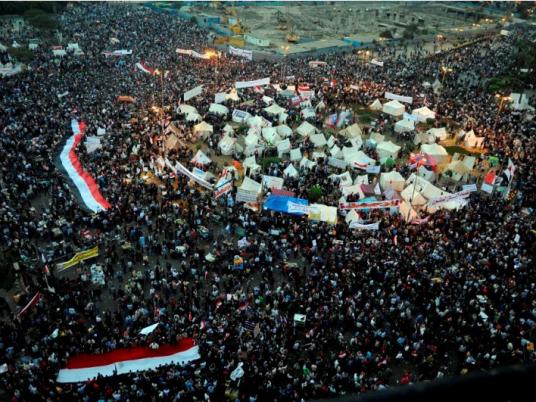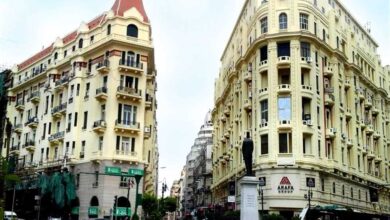
Tens of thousands gathered Friday in Tahrir Square, the birthplace of the 25 January revolution that ousted President Hosni Mubarak last February. They chanted slogans against President Mohamed Morsy, the Muslim Brotherhood and the Constituent Assembly.
Meanwhile, longtime reform advocate Mohamed ElBaradei and former presidential candidates Hamdeen Sabbahi and Amr Moussa said they would spend the night in Tahrir, pledging to join the protesters’ sit-in until Saturday.
All marches from different parts of Cairo had converged in the square by sunset. Marches started at different squares and neighborhoods from Giza, Sayeda Zeinab, Mohandiseen, Shubra, Dokki, Al-Azhar, Talaat Harb Street, Zamalek and Ramses Square.
Former presidential candidate Khaled Ali, a leftist lawyer, led the march from Ramses, while ElBaradei led the march from Shubra. Other public figures and politicians led other marches to the square from around the city.
ElBaradei delivered a speech to protesters in the square, threatening civil disobedience, according to Al-Ahram website.
He called on Morsy to urgently cancel the constitutional declaration and engage in national dialogue with other forces.
The draft constitution lacks legitimacy in terms of form and content, he said, and asked for agreement on a new constituent assembly set up to build a truly democratic system.
ElBaradei held Morsy full responsible for the consequences of putting the new constitution at stake, stressing the sit-in would remain peaceful in Tahrir and that all peaceful means of escalation would be used to achieve their demands.
He said civil disobedience is the only option for the cancellations of the draft constitution and the latest constitutional declaration issued by Morsy.
President Mohamed Morsy’s announcement of his declaration last Thursday sparked controversy and mobilized opposition groups. Demonstrators poured into Tahrir to join a sit-in started by hundreds of demonstrators after Morsy issued the declaration, which they say grants him unprecedented powers and makes him a new dictator.
Marches began arriving in Tahrir Square Friday afternoon for the “Martyrs’ Dream” mass demonstration, which many political parties, movements and revolutionary groups had called for to decry the declaration. Many protesters also decried the final constitutional draft, finished by the Islamist-dominated Constituent Assembly early the same morning.
A march that started at the liberal Wafd Party headquarters left Dokki and arrived in Tahrir, led by Moussa and Wafd Party head Al-Sayed al-Badawy. Several leading figures in the party were among the thousands who took part in the march.
Speaking to Al-Masry Al-Youm, Moussa called on Morsy take the current situation seriously and to put the weight of public opinion into consideration when making a decision. He added that Egypt was about to have a “civil war.”
Badawy said civil groups would continue protests and sit-ins until the cancellation of the new constitutional declaration and formation of a new constituent assembly representing all Egyptians.
The first march had arrived in Tahrir in the afternoon, having started at Al-Fatah Mosque in Ramses Square after prayers. State newspaper Al-Ahram said thousands participated. Protesters chanted anti-Morsy and anti-Brotherhood slogans, and participants raised the flags of their respective parties and movements.
In Tahrir, demonstrators chanted slogans rejecting the final constitutional draft, which was passed early Friday morning by the Islamist-dominated Constituent Assembly.
The April 6 Youth Movement led another march of dozens of protesters from Al-Nour Mosque in Abbaseya to Tahrir, chanting against the constitutional declaration, the Interior Ministry, the president and the Constituent Assembly, according to Al-Masry Al-Youm. Protesters wore T-shirts with a picture of April 6 member Gaber Salah, also known as Jika, who died in recent clashes between police and protesters near Mohamed Mahmoud Street. The shirts read, “Today is the spark of a second revolution.”
A massive demonstration also kicked off from Al-Azhar Mosque after prayers heading to Tahrir. Participants chanted against the Muslim Brotherhood and Salafis. “Egypt for all Egyptians, not Brothers and Salafis,” they chanted, along with “Down with the supreme guide’s rule,” referring to the Brotherhood’s leader.
In Giza Square, another march started from Al-Estiqama Mosque, with protesters angry about the preacher’s sermon, in which he called on worshippers to excuse the president, Al-Masry Al-Youm reported.
Their march had been scheduled to start later, but after the sermon, dozens gathered in front of the mosque and chanted, “Void the constitutional declaration, supreme guide rule is invalid, Brotherhood rule is void and Constituent Assembly is null.”
“We will continue the path as free revolutionaries,” they chanted, as well as “Leave, Morsy,” and “Down with the supreme guide’s rule.”
The Constitution Party, Popular Current Party and April 6 Youth Movement members took part in the protest, along with unaffiliated demonstrators. Minor scuffles took place between supporters of the president and marchers while they were on their way to Tahrir.
In Shubra, thousands participated in a march, with many joining after prayers at Khazendar Mosque. The Egyptian Social Democratic, Adl, Free Egyptians and Popular Current parties, as well as the Maspero Youth Union, the Socialist Popular Alliance and other Coptic movements, took part.
Protesters chanted phrases such as “Egyptian will remain civilian,” and raised pictures of Salah and Islam Fathy Massoud, two teenagers who have died in the recent clashes. Massoud died while defending the Muslim Brotherhood’s office in Damanhour.
Some altercations took place outside the mosque between worshippers over the constitutional declaration, and worshippers in favor of it asked those against it to move away from the mosque. Police intervened before the march started.
Protesters voice demands
Demonstrators call for canceling the new constitutional declaration, canceling the referendum on the current draft constitution, restructuring the Constituent Assembly to write a constitution that reflects the views of all Egyptians, and providing retribution for the martyrs of the revolution who have died since 25 January 2011.
Those victims would include those who died throughout the transition period and afterward, as recently as Salah, the April 6 Youth Movement member who was killed.
Protesters also demanded legislation that would allow for the retrial of symbols of the former regime and those who killed the martyrs, without protection or immunity. They also called for the dismissals of Interior Minister Ahmed Gamal Eddin and Prime Minister Hesham Qandil, the formation of a revolutionary cabinet, and the announcement of a clear plan for restructuring the Interior Ministry.
Sheikh Mohamed Abdallah delivered the Friday sermon in Tahrir, saying the revolution would continue until all demands raised by protesters on 25 January last year are achieved, according to Al-Masry Al-Youm. He warned that Morsy would have the same fate of former President Hosni Mubarak and join him in prison.
He said the deputy supreme guide of the Muslim Brotherhood, Khairat al-Shater, resembles Mubarak-era steel tycoon Ahmed Ezz, but the only difference between them is that Shater has a beard.
Abdallah criticized the application of a capitalist economic system like that of the former regime, saying it would increase poverty, and said there were rumors that Salafis led by Assem Abdel Maged, a member of the Jama’a al-Islamiya Shura Council, and Tarek al-Zomor, a Jama’a al-Islamiya member who had been convicted in President Anwar Sadat’s assassination, would storm the square.
“We are the lions of the revolution who protected it and will protect it in the future,” Abdallah said, according to the independent daily.
Thousands of protesters meanwhile marched after prayers from Mostafa Mahmoud Mosque in Mohandiseen to Tahrir, to protest the Constituent Assembly and the constitutional declaration. Protesters chanted several anti-regime slogans.
Popular Current Party founder Sabbahi said, “The protest is staged against the constitutional declaration and the draft constitution written by the Muslim Brotherhood and Salafis.”
Sabbahi added that Morsy’s statements in a televised speech Thursday reveal the stubbornness used to deal with demands of the 25 January revolutionaries.
“Morsy’s statements confirm that he doesn’t listen to the square [protesters], but only to his supporters,” Sabbahi said. “People will not accept that their president only represent one political category without the others.”
“Protesters will not accept a constitution written overnight,” he added.
Opposition unites
Among the most prominent participants are the Free Egyptians, Strong Egypt, Egyptian Social Democratic, and Constitution parties, as well as the April 6 Youth Movement Democratic and Ahmed Maher fronts, the Coalition of Egypt’s Copts, the Popular Democratic Movement, the Maspero Youth Union, the Voice of Freedom Movement, the Free Front for Peaceful Change, the Coalition of the Lotus Revolution and the Revolutionary Youth Union.
Marches were set to start after the Friday prayer from main mosques to squares in each city to protest the declaration, which exempts Morsy’s decisions from judicial supervision and prohibits the disbandment of the Constituent Assembly and the Shura Council.
The Popular Current Party called on all citizens to rally in Tahrir Square in protest against “attempts to abort the revolution and empower tyranny.”
The movement also said in a statement that peaceful sit-ins would continue until the martyrs’ dreams of freedom, social justice and human dignity are realized, retribution is achieved for them, and a constitution that reflects the revolution and its objectives is drafted.
It added that it would discuss with all political parties and movements methods of peaceful escalation if the legitimate demands of the Egyptian people are not met.
Khaled Talima, a member of the Popular Current’s executive office, said the “million-man” demonstration could march to the Shura Council and the presidential palace if the demands are not met. He also called for forming another constituent assembly that would represent all spectrums of Egyptian society.




